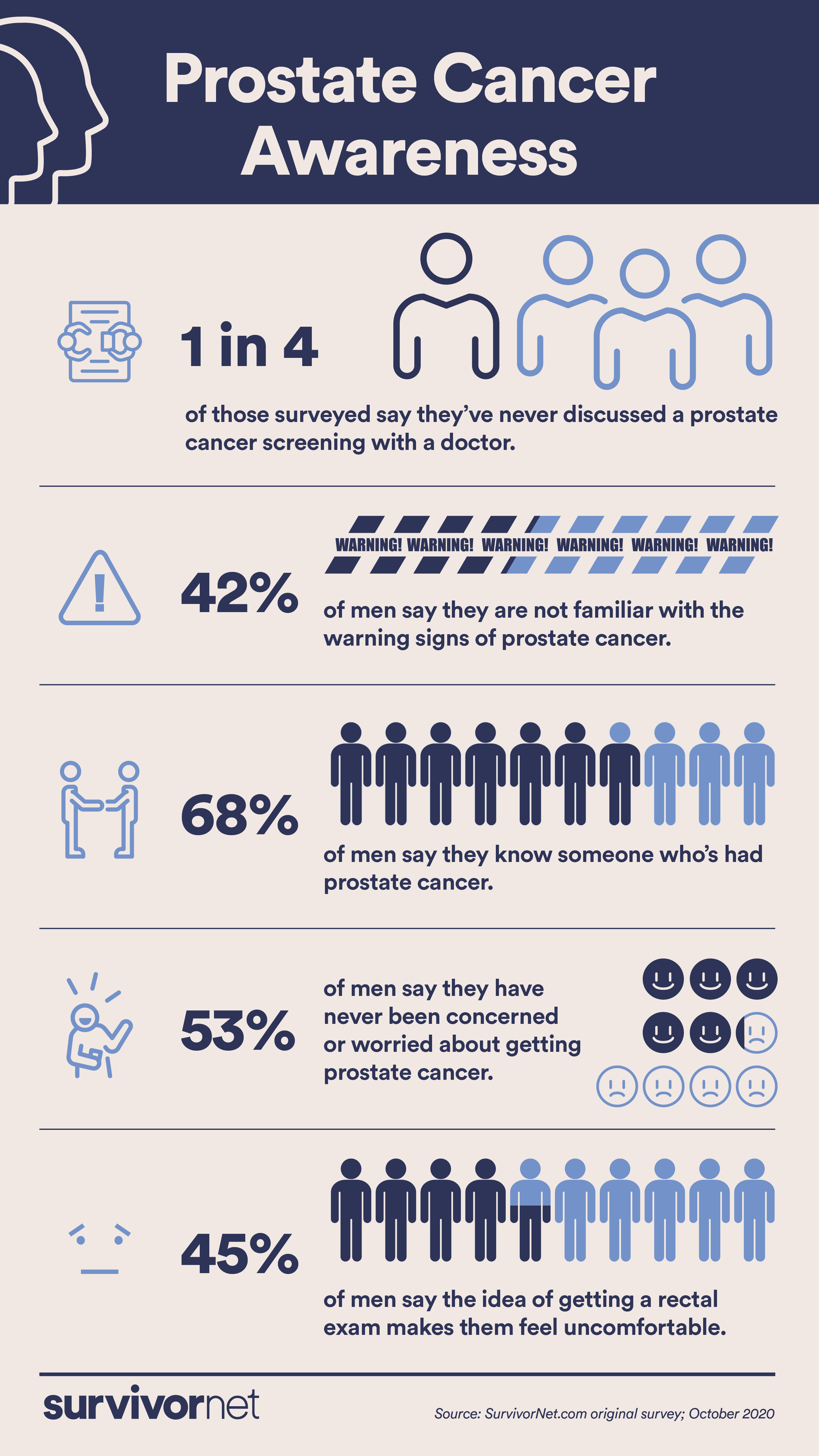Prostate Cancer Survey Findings
- 1 in 4 men surveyed said they've never discussed a prostate cancer screening with a doctor.
- 42% of men say they are not familiar with the warning signs of prostate cancer.
- Nearly 40% of men say they either delayed or skipped their doctor visits due to COVID-19 and more than 50% of men say they aren't concerned about getting prostate cancer themselves.
Read MoreScreening is slightly uncomfortable but painless, and takes less than 30 seconds.
SurvivorNet interviewed 511 men, aged 55 – 69, across the United States about their willingness, knowledge, and screening practices when it comes to their prostate health. Starting a dialogue around prostate cancer and screenings is an important step in helping to save lives, so make sure to discuss your prostate health with your physician.

Prostate Cancer Screening
1 in 4 men surveyed said they've never discussed a prostate cancer screening with a doctor. And 1 in 6 men surveyed say they've never had a prostate screening before. Prostate cancer screenings are done by PSA tests. The antigens are proteins produced by normal and malignant cells in the prostate gland. Thus, they can indicate the presence of cancer.
Dr. James Brooks, a urologic oncologist at Stanford Medicine, tells SurvivorNet, “Current guidelines are to start screening at age 55 and continue screening through age 70. The reason for that is prostate cancer diagnosed after age 70 has a reasonably low probability it’s going to take your life because prostate cancer, even in its aggressive forms, when it’s localized is a relatively slow-growing cancer.”
41% of men surveyed said they have no idea what the prostate’s function is within their body
Men who are high risk, due to family history, should begin their PSA testing earlier, around age 35. Having the PSA test at a younger age gives a more accurate read because the prostate has not increased in size, which can cause the test to be harder for the doctor to interpret.
In addition, Dr. Posadas tells SurvivorNet that this cancer is found in higher rates in Black and Latino men. He says "Prostate cancer affects men of all walks of life but it affects them differently." For example, the incidence of prostate cancer in Black men is 60 percent higher, and they are two to three times more likely to die from the disease.
The PSA Blood Test and a Rectal Exam are Vital for Prostate Cancer Screening
Prostate Cancer Warning Signs
42% of men say they are not familiar with the warning signs of prostate cancer. Although a whopping 68% of men say they know someone who's had prostate cancer, more than 50% of men say they aren't concerned about getting prostate cancer themselves.
Related: Prostate Cancer Survivor Mandy Patinkin, 67, Keeps Quarantine Silly & Fun With His Family
Early prostate cancer typically causes no symptoms, according to the American Cancer Society (ACS). Advanced prostate cancer, however, can lead to the following symptoms:
- Problems urinating
- Blood in the urine or semen
- Trouble getting an erection
- Pain in the hips, back (spine), chest (ribs), or other areas from cancer that has spread to bones
- Weakness or numbness in the legs or feet
Avoiding the Doctor Due to COVID-19 and Discomfort
Nearly 40% of men say they have avoided doctors' appointments because of COVID-19. And they’re not alone; in a recent SurvivorNet survey, 30% of women said they have delayed getting mammograms because of COVID-19, and feeling nervous about going to the doctor.
Apart from COVID-19 concerns, some men skip out for other reasons. 45% of men say the idea of getting a rectal exam makes them feel uncomfortable. Additionally, some men are unsure about the function of their prostate 41% of men surveyed said they have no idea what the body part’s function is.
Why You May Have a Greater Risk When it Comes to Prostate Cancer
Learn more about SurvivorNet's rigorous medical review process.

